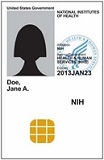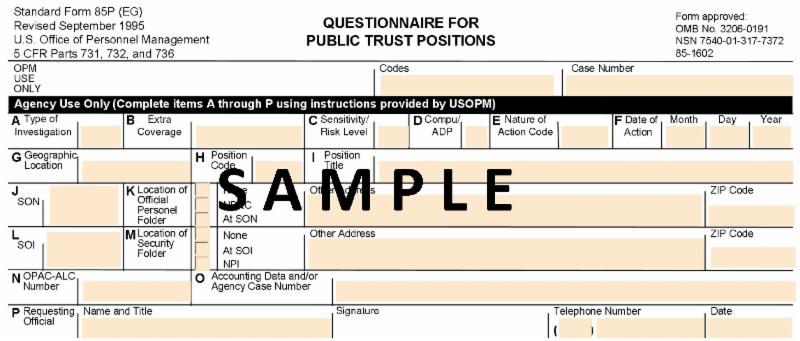|
|
| March 14, 2018 issue of the DPSAC NEWS |
|
|
| Contact Us Division of Personnel Security and Access Control (DPSAC), Office of Research Services Building 31, Room 1B03
Hours: 8:00 a.m. - 5:00 p.m. Monday - Friday Personnel Security Helpdesk: 301-402-9755 E-mail: orspersonnelsecurity@ mail.nih.gov Access Control Helpdesk: 301-451-4766 E-mail: facilityaccesscontrol@ mail.nih.gov   |
|
| |

All Special Government Employees (SGEs) to Temporarily Receive NIH ID "Legacy" Badges
Until further notice, all SGEs registered in the NIH Enterprise Directory (NED) who require NIH physical access will receive an NIH ID "legacy" badge following a name check (NCIC) by the NIH Police.
DPSAC had intended to start issuing Restricted Local Access (RLA) badges in November 2017 to the small number of NIH Government Employees (SGEs) requiring both physical and logical access. DPSAC now expects to begin issuing RLA badges to SGEs requiring both physical and logical access sometime later this spring.
|
New Supplemental Form to Help Expedite the Background Investigations for Some SF-85P Public Trust Applicants

In an effort by the Office of Personnel Management (OPM) National Background Investigations Bureau (NBIB) to trim its backlog, OPM's NBIB is streamlining several of it's background investigation procedures.
As part of these efforts, the Standard Form (SF)-85P Questionnaire for Public Trust positions, is being updated to include additional expanding questions for Public Trust Moderate Risk positions.
OPM, as the Suitability Executive Agent, has authorized the use of interim data collection techniques to obtain the new information that is not currently captured on the SF-85P questionnaire in e-QIP.
Beginning in March 2018, DPSAC will start requiring any individuals in Moderate Risk Public Trust positions to complete the NBIB-provided supplemental form along with their SF-85P questionnaire.
This interim data collection form will be used until NBIB has integrated the changes directly into e-QIP. NBIB expects this change will be finalized in the spring of 2019.
The supplemental form will allow DPSAC to assist NBIB with identifying public trust applicants that can be streamlined and expedited through the Tier 2 investigation (formerly known as the MBI investigation).
Until now, a lengthy investigation has been required for all public trust applicants. DPSAC notes that AOs and their public trust applicants will start seeing these supplemental forms soon.
According to DPSAC specialists, the supplemental form consists of approximately 30 'Yes' or 'No' questions and the time required to complete the supplemental questionnaire will be nominal.
DPSAC wants to emphasize that individuals should exercise the same standards and care in completing this supplemental form as they would when completing the online SF-85P.
|
Helpful Tips
You can find helpful information about your HHS ID Badge, including how to use your badge to login, send/receive encrypted e-mail and digitally sign documents at: http://smartcard.nih.gov.
ALT cards -- should be returned to the
IC ALT card coordinator
-
NOT to the Division of Personnel Security and Access Control (DPSAC).
Once ORS Personnel Security has approved the request, it will forward the name(s) to
HHSIdentityAdmins@deloitte.com to complete the approval process, add the name(s) to the LWS operator roster, and inform the IC that the individual is now approved to operate the LWS.
Need to make changes to the LWS operator directories? -- drop an e-mail to Lanny Newman,
newmanl@mail.nih.gov, and let him know what needs changing (e.g., adding new operators or LWS locations, removing operators, etc.). Remember, before a new operator can be added to the LWS directory, s/he must first be approved (see preceding Helpful Tip).
If an LWS is not available in your IC or your immediate area, and you work in the greater Bethesda or Rockville area -- please call 301-402-9755 to schedule an appointment with DPSAC, located in Building 31, Room 1B03 or in Building 10, South Lobby, Room 1C52.
If you work outside the Bethesda/Rockville area, contact your local badge issuance office. You can find contact information for all badge issuance offices at:
http://www.ors.od.nih.gov/ser/dpsac/Pages/contactinfo.aspx.
|
|
FAQs
Q. What should I do if I forget my PIV card at home but need to use it to access "sensitive applications" on my computer.
A. According to the NIH Office of the Chief Information Officer, the short answer is "do not forget your PIV card."
Most users will need to learn how important it is to *always* have their PIV card with them if they need to access 'sensitive' applications. The U.S. Military as well as many public and private organizations have adopted this policy for their workforces.
Those who forget their PIV Card can contact CIT to request an exception in order to use their user name and password for that day. This will allow you to access the NIH network, but may not allow access to all sensitive applications.
Q.
We have a disabled staff member who has a PIV card but cannot make it into the office to have her PIN reset for her PIV Card (HHS ID Badge). What are the options for her and other staff like her?
A.
One possibility is to issue her a "token" that would be used to log into the IT system. The "token" may be issued by your IC's Information System Security Officer (ISSO). The Office of the Chief Information Officer (OCIO) has posted ISSOs for all ICs at:
http://ocio.nih.gov/nihsecurity/scroster.html
.
|
|
| |
|
|
|
A biweekly e-newsletter from the National Institutes of Health, Office of Research Services, Division of Personnel Security and Access Control (ORS/DPSAC) to keep its readers informed of personnel security and access control policies and practices designed to safeguard the NIH and its workforce. DPSAC is responsible for verifying personal identity, validating suitability, reviewing background checks, authorizing facility access and issuing ID badges for NIH personnel.
Department of Health and Human Services
National Institutes of Health
Office of Management
Office of Research Services
Division of Personnel Security and Access Control
|
|
|